Paul Read's Blog: Speaking Of Spain, page 3
October 20, 2014
Why You need to Listen to The A to Z of Spanish Culture
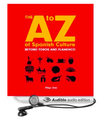 I do not usually do reviews here. Mostly, because I think so much of what we like or do not like is subjective. Additionally, my personal choices are not only personal, but often affront the delicate tastes of others. However, recently I had the opportunity to review the audiobook version of the A to Z of Spanish Culture by Pilar Orti, and three things occurred to change my mind. It's unusual to find books in English about living and understanding Spain by a Spanish Author. Most are by deluded expats.
I do not usually do reviews here. Mostly, because I think so much of what we like or do not like is subjective. Additionally, my personal choices are not only personal, but often affront the delicate tastes of others. However, recently I had the opportunity to review the audiobook version of the A to Z of Spanish Culture by Pilar Orti, and three things occurred to change my mind. It's unusual to find books in English about living and understanding Spain by a Spanish Author. Most are by deluded expats.The format of an audio book lends itself to the subject matter, given Pilar is Spanish and her intimate knowledge of the country and the language proved to be not just a novel factor, but one of great help in drawing you into the ambience of each section.
Finally, any book that has a chapter on the background and use of the verb Joder, was worth an extra look at.
So, I gradually became engrossed in the stories of Spanish Culture. Subjects that rolled effortlessly from one to another, and even after 20 years in the country, I quickly realised that there was so much I still did not know: From food, Saints names, art history, immigration, politics, puentes, pateras and zarzuelas - to alcohol, sport and of course, theatre, arts, cinema and literature.
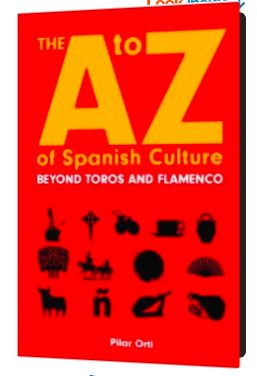 In one of my favourite parts she recaps seven Spanish language authors that she suggests we might find of interest. Such were her descriptions and explanations that I had to stop the audio several times to write down those authors I wanted to hunt out immediately. And this is something I think you will find yourself doing again and again. Suddenly there is an explanation of a phrase, or the use of a certain refran.
In one of my favourite parts she recaps seven Spanish language authors that she suggests we might find of interest. Such were her descriptions and explanations that I had to stop the audio several times to write down those authors I wanted to hunt out immediately. And this is something I think you will find yourself doing again and again. Suddenly there is an explanation of a phrase, or the use of a certain refran. And, as someone fascinated by Spanish history, the accounts of some of the most significant events in the 20th century - such as the transition to democracy and the attempted military coup in under Lieutenant-Colonel Antonio Tejero were told with such drama, that I felt I was reliving the whole episode.
If someone was to ask me if I would recommend this 3.15 hours length audiobook, not only would I say yes, but I would add it should be obligatory listening to anyone who rents, buys or visits Spain for longer than a weekend. You have been advised.
At the very end of the book, Pilar concludes that she hopes her book will have made you at least smile or think. Well I did both - and often. I'm sure you will too. The A to Z of Spanish Culture is available on Amazon Audible. Get it from this link here.
October 5, 2014
The Slow Route Home: Living In Spain at Another Pace
 Like the Poster? Then Pinterest it! Take 15 minutes out. Go on, do it now.
Like the Poster? Then Pinterest it! Take 15 minutes out. Go on, do it now. Take out a quarter of an hour, plug in your headphones, put your feet up and transport yourself to the very center of Andalusia for this ambient, audible short story on how to live life at an altogether different pace.
Just don't rush it. Savour the moment. Laugh, sip your tea and just relax.
For there is another way of looking at the world - a view that is rapidly disappearing. But there is one man that is carving another route home: The Slow Route, and in his time-consuming way, he is showing the rest of us another path.
Take The Slow Route Home
 Based on Gandhi's belief that we should live the way we wish the world to be - Miguel displays a wisdom that others have forgotten,
Based on Gandhi's belief that we should live the way we wish the world to be - Miguel displays a wisdom that others have forgotten,Download the audiofile to your phone or mp3 player, listen to it here on this webpage, watch the video introduction below, or go the whole way, find out how to step forward with a slower pace and grab the whole story on Amazon here for 99c or less.
Listen or download the Audio Story... Want more audio? Subscribe to Speaking of Spain podcast in itunes or here.
Don't want to miss another episode? Then subscribe to the mOnks mailing list and get a free Photo book on Spain. Find out more here. Watch the Slow Video
September 19, 2014
1984 And the Spanish Civil War
What power have you got? Where did you get it from? In whose interests do you exercise it? To whom are you accountable? And how can we get rid of you? Now, it strikes me that, were I to sit Mariano Rajoy down with a drink and say: "Look Mariano, I'm going to ask you 5 questions, and between you, me and this glass of gazpacho, be honest." I think he'd answer:
Complete and Total
We have always had it. Our own. No-one You can't.

 But things were not always like this. Once upon a time - for a fleeting moment in history - Spain enjoyed a flourishing democracy unlike anything the world had seen before, but it lasted just a few months. One man, however, witnessed that moment and wrote down the lessons he learnt in 3 majorly important books:
But things were not always like this. Once upon a time - for a fleeting moment in history - Spain enjoyed a flourishing democracy unlike anything the world had seen before, but it lasted just a few months. One man, however, witnessed that moment and wrote down the lessons he learnt in 3 majorly important books:Homage to Catalonia
Animal Farm 1984
And his name, was George Orwell. (Read More below for video and podcast on Orwell) It's an Orwell Feast! Orwell is back. To celebrate, the Gazpachomonk offers an feast of Orwellian goodies:
The Orwell slideshow/Video on the right of this column. The poster selection below (ideal to send to newspeak enemies) The list of Anarchic phrases to slip into the next pub-debate. The Orwell Podcast (with an audio snippet from the book - see below) The Interview published last week with the civil war volunteer.
The Pre-order link to 1984 and the Spanish Civil War
September the 22nd 2014 is the release date for 1984 and the Spanish Civil War. This Amazon "Short-read" tells the story of Orwell in Spain, the impact his time in Barcelona had on his writing and how his legacy, and that of the Spanish Revolution, is changing the country.
1984 and the Spanish Civil War is the second book in the Forgotten Stories From Spain trilogy, the first being the Ambulance Man and the Spanish Civil War (2nd Edition), and the final book: The Bank Robber and the Spanish Civil War - due out at the end of the year.
The Forgotten Stories series looks at particular moments during the civil war, and explores their relevance back then, and now. So if you want to know more about this fascinating time in Spanish history, or when the next book is released, or podcast, or video, etc then sign up for the email notifications here and get a free photobook at the same time.
In the meantime, enjoy the Orwell feast...
The music to this episode is a version of: A Las Barricadas by Brossa Quartet de Corda Anarchic Sentences to slip into the conversation: You cannot buy a revolution. You cannot make a revolution. You can only be a revolution. It is in your spirit, or it is nowhere. There is no end. There is only process. Your'e just a buyer or a seller. You have no relation to things, but that of possession! Watch HERE ON YOUTUBE for better Picture and Sounds September 22nd is the Release for 1984.
To find out more click on the
image below.
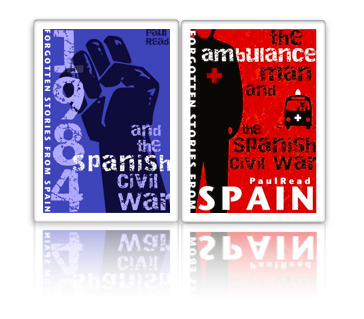 Posters to Collect and Swap! Some of the images below can be found in the new book: 1984 and the Spanish Civil War. But not all...
Posters to Collect and Swap! Some of the images below can be found in the new book: 1984 and the Spanish Civil War. But not all...
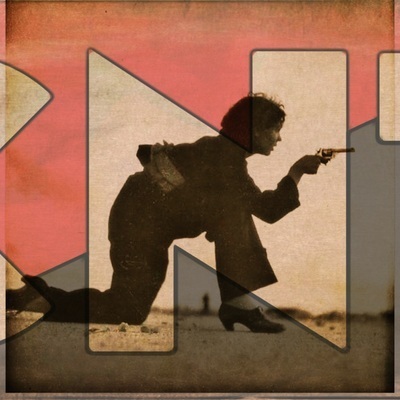
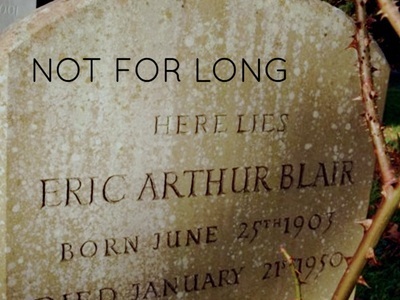

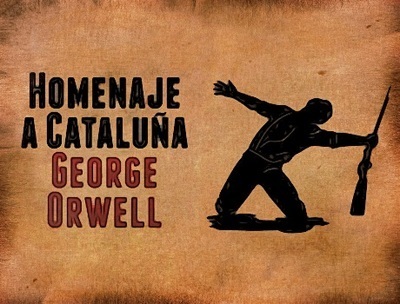
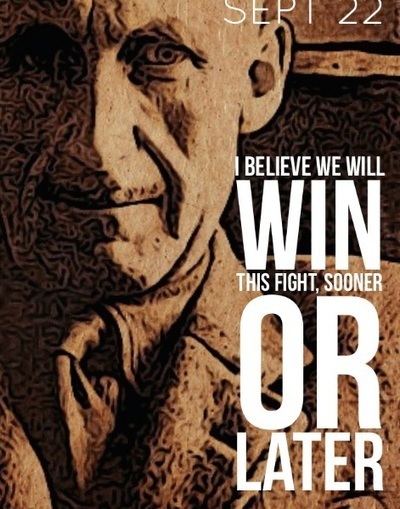
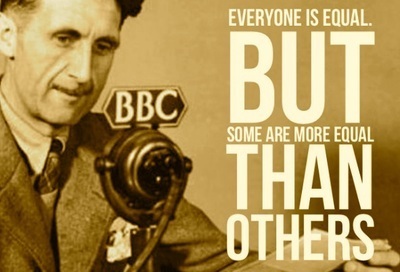

September 12, 2014
An Interview With A Volunteer From The Spanish Civil War: Sol Frankel
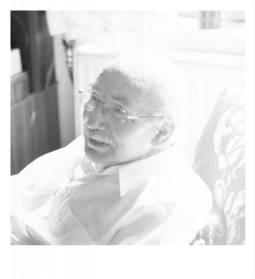 Sol Frankel One October evening, 12 years ago I received a phone call. "Could I give a talk on Living in Spain at a Hotel in Almuñecar, on the Granada coast?" Someone had fallen ill and they needed a quick replacement.
Sol Frankel One October evening, 12 years ago I received a phone call. "Could I give a talk on Living in Spain at a Hotel in Almuñecar, on the Granada coast?" Someone had fallen ill and they needed a quick replacement.That evening, I stood in front of a group of British pensioners trying to respond to questions on oily food, the whereabouts of fresh milk in town and why more Spaniards don't learn English. At one point I introduced the subject of Spanish Culture and Spanish history. One guy began to snore, another left, but one man, sitting at the front, looked up and waved his walking stick in my direction as I mentioned the British volunteers in the Spanish Civil War.
Yes? I said, stepping back from the stick.
"I remember," he said, thrusting the stick at me as though it was a rifle, "the only weapons we had then were antiquated Russian rifles that had come via Mexico."
"You remember?" I said.
"Yes, of course." He replied. "After all, I was there." (Read on for the full interview with Sol Frankel, the International Brigade fighter.)
An Interview With Sol Frankel Sol is a small man of medium build, wearing a faint grey moustache, fragile glasses and a warming smile. He clutches a worn walking stick. His right arm hangs loosely at his side.
I found him sitting alone at a table in the cafeteria the following day. He looked a little unsure as to whether I would come for the arranged interview, but when he saw me his face broke into a welcoming smile. I went to shake his hand, but it was too late. I had forgotten about his damaged arm. But Sol, even at 88 years of age, was quicker than I. His left arm shoots across and clumsily grasps my right. He smiles at me with his eyes, and I relax. I pull up a chair alongside Sol who is clutching an A4 envelope to his chest. "Not many people ask about this part of my life any more," he says. "Especially younger people."
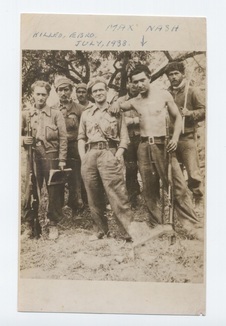 I had left my dog tied-up outside the hotel. So I asked if he wouldn’t mind moving out to the terrace, not to leave the animal alone. As we sat down at another table outside, he immediately springs back up. "I'll go get us a tea, " he offers.
I had left my dog tied-up outside the hotel. So I asked if he wouldn’t mind moving out to the terrace, not to leave the animal alone. As we sat down at another table outside, he immediately springs back up. "I'll go get us a tea, " he offers. Whilst he is gone, I glance at the documents he has left on the table. An International Brigade membership card is dated 1937. It is a little faded by the sun, and crumbles at the edges of the pages. It carries no photo, but plenty of official Republican stamps on its delicate surface. This is the first time I have ever seen an official document from that period. I felt it should be in a museum, but glad it wasn’t. Underneath the card is an old group photo of soldiers at the front. One man, with a characteristic moustache is smoking a pipe between several other men. He looks familiar. Another man is bare-chested. Above him is an arrow that Sol has drawn and a name. Added were the words “killed”.
East London To Spain Born 31st March 1914 in Stepney, East London, Sol describes himself as a typical anti-fascist, so prevalent then amongst the Jewish working classes living in the midst of the inner city. I begin by asking him about what motivated him in going to Spain to fight for a people he knew nothing of.
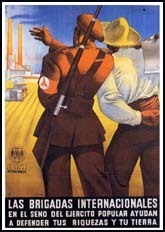 I was a member of the anti-fascists, he explains, telling me that he had volunteered to work for 5 weeks in a camp for 3000 refugee children from Bilbao. He recalls the time as formative, digging latrines and teaching English to the adults that had accompanied the children.
I was a member of the anti-fascists, he explains, telling me that he had volunteered to work for 5 weeks in a camp for 3000 refugee children from Bilbao. He recalls the time as formative, digging latrines and teaching English to the adults that had accompanied the children.It was after this, as the civil war continued that Sol approached the British Communist Party to volunteer for the International Brigades. They lent him the fare to get himself to Paris by boat. France and England had signed a policy of non-intervention in the Civil War (though both countries were continuing to sell arms to the fascist states as well as conduct business with Franco´s Nationalists). Officially though, neither country could be seen to help the republican cause and so, when asked on the boat over to France about his destination, Sol had to pretend he was visiting an Uncle in Paris. He recalls that once there, he was met by the French Communist Party who provided him with a ticket to the Pyrenees. On the train towards Spain he was told to keep his head down as French Police would be looking for foreigners making their way to the border. "But they weren’t all bad", he adds smiling. "I remember some French Police giving us the Communist salute as we peered out the windows when the train departed from some of the stations."
At the border he was taken to a series of safe houses whilst gradually, more volunteers joined him from other countries. “There were three or four of us from Britain” but many others from France, Italy and even Germany. Eventually a coach arrived one night and about 70 of us went into the mountains."
From where the coach left them, they had to walk in a single file for 7 – 8 hours across the Pyrenees until they entered Spain. Sol remembers that they were issued deck shoes for better grip and to walk making less noise. His boots were tied by shoe laces together and hung around his head for the duration of the walk. He also remembered his first glimpse of the Mediterranean at sunrise, after the long walk through the night. The distinct blue of the sea was a sight he still remembers vividly. Finally, another vehicle took them to Figueras where they were all housed in the town castle for a few days before being moved on. He was later moved to Gerona and then Albecete where he undertook his training.
“Most of us had done some military training” he recounts, “so were already familiar with a lot of it. We worked in companies according to where you were from. The training lasted two weeks before being moved to the front. For some reason I stayed for four weeks. I was lucky I suppose”
Running at the Front
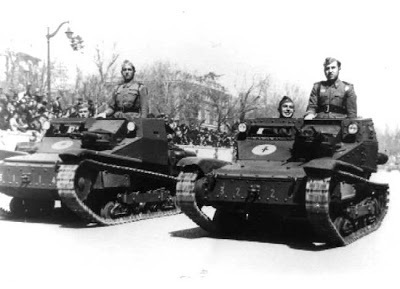 Italalian tanks Sol was a sergeant and so had 18 men under him. One of which he remembers was Lewis Clive who went on to become the company commander. After his 4 weeks training, Sol was moved to the front as part of a company of 650 men. He remembers the day clearly. Resting both hands on his stick, he leans forward and says that first day on the front was one he will never forget.
Italalian tanks Sol was a sergeant and so had 18 men under him. One of which he remembers was Lewis Clive who went on to become the company commander. After his 4 weeks training, Sol was moved to the front as part of a company of 650 men. He remembers the day clearly. Resting both hands on his stick, he leans forward and says that first day on the front was one he will never forget. It was his 24th birthday and the group had walked straight into a large Fascist tank division. “The tanks were Italian and as close to me as that tree is over there,” he says pointing his rifle-stick at a palm tree no more than ten yards away. "Out of the 650 men only 90 made it back to the camp." Sol picks up his tea, pauses, his cup suspended above the table, his eyes searching for some meaning in the events of that day.
"What happened?" I ask.
"They were all captured or killed."
"How did you manage to get away?"
The cup remains suspended in the air. Slightly shaking, he lifts the tea cup to his mouth and takes a sip. He looks back to me and his endearing smile returns. “ I ran." He said. "I could run really fast in those days”.
Wounded
After that, he was given the job to hold a mountain pass near the mouth of the Ebro. The most vivid memory of this time was when the bridge was blown up and they couldn’t get the equipment across. "Who couldn't Sol?" He looks up. His eyes are unclear. "Some people", he says. His details are vague. He is trying to recount a story from 65 years ago. Certain events are clear, others have left him a long time ago, inhabiting other places now.
I tap on the photo lying on the table. "That you?". "Yes", he replies. “ He points at the rifle in the picture. "We used Russian arms that had come via Mexico. A lot were not very good and there was a shortage of ammo.”
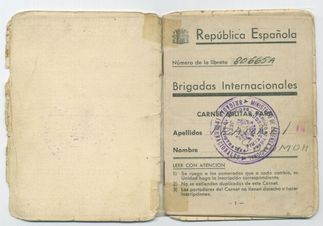 “And how did you receive your injury Sol?” I finally ask.
“And how did you receive your injury Sol?” I finally ask.Sol lifts his stick-rifle and takes aim at two pensioners just returning from the beach. “I was shooting facing this direction” he recounts, shuffling his bad arm into use. “When suddenly I felt a pain in this arm. I had been shot through my right arm from the back.” He puts down his weapon and rolls up his sleeve to show a scar on both sides of the upper arm. “Bullet went right through see? It felt like I had been kicked by a horse. A couple of mates held me up and helped me to where a stretcher could get to me. Eventually an Ambulance came and took me to the infamous cave hospital. From there I was eventually moved to a Hospital in Barcelona. I stayed there 3 days. I remember we were bombed every night in that hospital. I thought I would be out in a couple of days and back to the front. But the bullet had severed the muscle and the nerves. So I was moved to the International Brigade hospital. From there I was eventually returned home."
"And what was it like to get home?"
Sol smiles. "We received a truly warm welcome on return at Victoria Station. Hundreds, if not thousands came out to greet us. By that time, of course the International Brigades had been disbanded as you know.”
(In a futile attempt to persuade Franco to stop accepting Italian and German assistance, the International Brigades were disbanded and sent back to their respective countries. Many, such as the German and Italians volunteers had no country to return to. It was a controversial decision. Meanwhile, Franco continued to receive International support.)
International Brigades and Spanish Recognition
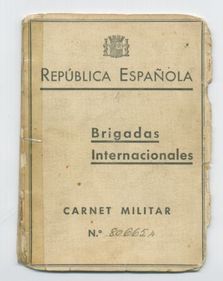 Sol digs into his envelope he has been carrying with him and produces a yearly bulletin from the members of the International Brigades. “Did you see the memorial sculpture on the south bank?” he asks handing me a leaflet.
Sol digs into his envelope he has been carrying with him and produces a yearly bulletin from the members of the International Brigades. “Did you see the memorial sculpture on the south bank?” he asks handing me a leaflet. "Yes, Ive seen it Sol".
“And did you see this?” Sol produces from his back pocket a life membership card for the UGT (UNION GENERAL DE TRABAJADORES), and from the envelope again a letter from the Spanish Government offering him Spanish Nationality in thanks for his sacrifices made.
“I didn’t take them up on that because it would have meant giving up my British Nationality."
"It stops many of us taking up Spanish Nationality Sol."
"Silly really. Isn't it? Otherwise, I would have.”
“Do you always carry this stuff around with you Sol, when you come to Spain that is?”:
“When I come to Spain yes. Although, not many people ask me, or are interested these days. Do you know I was interviewed for the David Leech film, I was interviewed by students of Paul Preston."
"No. But I'll look forward to seeing it Sol".
"Yes," he says. "You should see it." His arm goes limp again. His eyes look out to sea as though he were searching for something. "No, not many people ask me now. You see there is not many of us Brigadistas left. Probably just about 20 now." He rests both hands on the top of his walking stick again and looks over to me. His eyes flicker and he says: "You know, each year we still get together."
Then his smile fades a little as his chin drops onto his hands. "But each year there are less and less of us. Once upon a time we would have a meal and spend a few hours together. Now we just meet for a drink and don’t stay long. We are all getting on a bit now you see.”
This Interview between Sol Frankel and the GazpachomOnk took place on Saturday 26th October 2002, Hotel Helios, Almuñecar, Granada. Sol Frankel died on 18th May 2007, aged 93.
 Photo supplied courtesy of Sol Frankel's son.
Photo supplied courtesy of Sol Frankel's son.
August 19, 2014
The Legacy of Lorca: Laying Claim to the Genius of Lorca
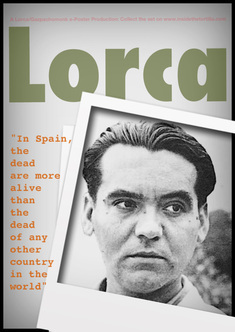 Click to Grab The Free Poster Here On this anniversary of his death, the Gazpachomonk investigates the Legacy of Lorca, offering this small insight, a free Poster to download, an Ode to the Poet, and links to the comprehensive Lorca Podcast by Pilar Orti.
Click to Grab The Free Poster Here On this anniversary of his death, the Gazpachomonk investigates the Legacy of Lorca, offering this small insight, a free Poster to download, an Ode to the Poet, and links to the comprehensive Lorca Podcast by Pilar Orti. When Freddy Lorca wrote that "In Spain the dead were more alive than in any other country" - was he perhaps foreseeing his own legacy - a magical legacy of mystery, mysticism and controversy?
Having studied Lorca at University 25 years ago I had always wondered how he could be embraced as a national hero by both those that had applauded him, and those that had assassinated him.
Indisputably Lorca was a supporter of the 2nd Republic. And indisputably he was killed by the fascists at the outbreak of the civil war. But other than that, what did we really know?
Was Lorca the darling of the arty left - or - was Ex-Prime Minister and Evil Goblin Aznar correct when he said of Lorca: "Poetry has no ideology, it is but spirit and beauty."
To claim Lorca as theirs, the Political Right must sanitise him, cleanse him and deny his sexuality turning him into a romantic Iberian, a "true" Spaniard. Whilst the Political Left embraces his internationality, his agenda for a better world - but overlook his close friendship with certain members of the 'falange'.
So what did Lorca himself say?
"The artist and in particular the poet, is always an anarchist in the best sense of the word."
Was Lorca secretly a member of Anonymous? What did he mean by the "best sense of the word"?
For the answer we must look at the Spain of the 1930s'
The Anarchists in Catalonia opened free schools which prohibited political doctrine, emphasising individual artistic and creative development. Anarchism represented the highest ideals in the arts - equality of opportunity, equality of the sexes, - a freedom of education and freedom of expression unparalleled in any other political movement of the time.
Perhaps this is what Lorca meant - perhaps this is his legacy to Spain - or to what many still describe as the two Spains'. Whatever the conclusion, his revolutionary poetry will continue to inspire others - such as this little known and recently discovered treasure:
ODE TO LORCA by a relatively unknown poet: G. P. Monk. Ode to Memory of Lorca

Ideas to celebrate Lorca Day:
(Recently Discovered)
Freddy Lorca Not...
from Mallorca,
lyrical maker
Poetical Creator Not
to be confused
With Skytrain maker,
Freddy Laker
Freddy Lorca Not...
a New Yorker.
Romancero Gitano,
Granadino,
Pre Obama
his Barraca.
Next to the anarchist
Torero,
everyones hero
Shot cold.
Still being sold
Freddie Lorca You...
Anarchic Andaloo
Of the 27 Crew.
True but to
You,
Walker
Talker
Freddy Lorca
1: Listen to the complete Lorca podcast here.
2: Grab the poster above and cut out Lorca's face and wear it as a mask. Then, with copy of Romancero Gitano in hand, stroll into your nearest bar - one arm held aloof - and treat the punters to a random poem.
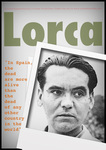
August 16, 2014
American Women in the Spanish Civil War
Put aside that article on SEO tips; defer reading that engaging looking sequel to 'Driving over Churros; postpone ironing that polka dot mini skirt for the feria this week - instead brew up a cup of tea, put your feet up on the dog and watch this fascinating two-part video. Personal accounts of dedication, altruism and bravery accompany these various tales of the volunteers that gave so much - until their exile in 1938.
Silly Idea In a vain attempt to pressure Franco on withdrawing the Italian and German troops (is it possible to reason with a dictator?) the Republican Government ordered the withdrawal of the International Brigades in the hope that the Nationalists would follow suit. Silly Idea.
The Italians remained, as did the German air force, whilst the Republicans - already having lost many of their best militia groups - were now to lose their International Brigades. Sad Story.
For more stories on the Spanish Civil war see Bethune, Lee, McDonald and get ready for the new book: 1984 and the Spanish Civil War - out next month. Sign up here for first news.
July 14, 2014
Feliz Cumpli Durruti 118 today!
 Durruti famously carrying out his domestic chores
Durruti famously carrying out his domestic chores Feliz Cumpli #Spanish Revolutionist bank robber & #anarchist #Durruti (118 today... but for a suspicious bullet )
Don an appropriate anarchist hat, select something black and red to wrap around your neck and revel in the revolutionary spirit of the times.
Read the full story here:
June 30, 2014
Leòn Felipe: The Poetical Pharmacist
Leòn Felipe is today's curious character from Spanish history. This series of brief posts aim to simply introduce you to some of the lesser known individuals of contemporary Spanish history.
People who lived life with a passion and a dedication to principle, politics and culture.

Leòn Felipe was a reluctant pharmicist but avid anti-fascist poet born in Zamora, Spain.
He had earlier worked as a stand up comic in a touring theatre company, spent 3 years in prison for fraud and later worked as a literature professor in the USA.
Leòn Felipe fought in the civil war in defense of the Republic and in 1938 was exiled to Mexico where he died 30 years later.

On Leaving Spain
"Brother, yours is the estate,
The house, the horse and the gun,
Mine is the old voice of the earth.
You have everything.
Yet I leave you voiceless, voiceless,
I go off with the song."
Felipe and Che Guevara's Notebooks
He remains, with Garcia Lorca, one of most well remembered poets of the generation of 27
It is said that several of Felipe's poems were found in the notebook of Che Guevara's when he was finally captured by the Bolivian Army and the CIA.
Want mOre stories on Characters From the Spanish civil war? Read about the Ambulance Man, the spy and the Exodus below.
June 24, 2014
Orson Welles And His Affair With Spain
This is the story of how the best film director of all time (British Film Institute), the man remembered for his love of wine, food, beards and cigars - built a relationship with Spain that spread over the course of his entire life - and even in his death.
Hemingway and "The Spanish Earth" Some say his it all began when he arrived at the age of 17 in Seville and fell in love with the city, the romance and the bulls - or maybe it was the bullrings. Others say it happened at a later stage, when asked by Hemingway to narrate the classic film in support of the Sppnish Republic - The Spanish Earth.
Orson was chosen to narrate the film because he had become the voice of his times. He could convince you that the Earth was being invaded by Martians, or that Carlsberg is "Probably the best lager in the world" or that frozen peas were something to salivate over in the supermarket.
But such a voice can be too good, as he was to discover later in life. Hemingway, came to a similar conclusion and ended up narrating another version of the film, saying Welles was too drammatic and his voice shifted the focus away from the real issues underlying the film. Whatever the true reason, Orson's love affair with Spain had begun.
(Read the rest of this article here)
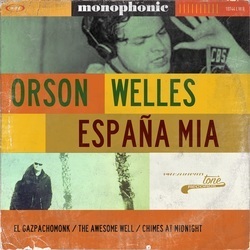
“Nuestros trabajos en piedra, en pintura, en impreso están a salvo -algunas de ellas por unas pocas décadas, o uno o dos milenios- pero finalmente todo deberá caer en la guerra o desaparecer en la final y universal ceniza. Los triunfos y los fraudes, los tesoros y las falsificaciones. Es un hecho de la vida. Vamos a morir. "Se de buen corazón", grita el artista muerto desde el pasado vivo, "nuestras canciones serán todas silenciadas, ¿pero qué importa?, sigue cantando.”
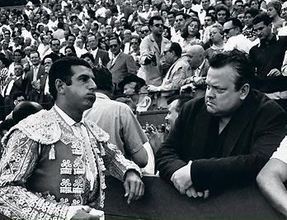 Orson and La Corrida Around the World with Orson and Paola Mori
Orson and La Corrida Around the World with Orson and Paola Mori
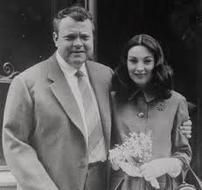 Orson and Paola In 1955, Welles married Italian actress Paola Mori, a woman he would share not just his living quarters near Madrid, but later his well-shaped tomb in Ronda. The same year as the marriage, a British Rediffusion TV project proposed that Welles travel to different European locations, exploring and commenting on the culture and peoples of each place.
Orson and Paola In 1955, Welles married Italian actress Paola Mori, a woman he would share not just his living quarters near Madrid, but later his well-shaped tomb in Ronda. The same year as the marriage, a British Rediffusion TV project proposed that Welles travel to different European locations, exploring and commenting on the culture and peoples of each place. Called: "Around the World" Welles set off to the Basque country for one episode. In this fascinating insight into the land during the 1950's Welles narrates, contemplates and ponders, speaking of culture, quality of life, pace, progress, technology and fiestas.
Perhaps..."Getting things done are more important than living a certain way, being a certain thing. "Watch the wonderful film in English here.
The serious was not a great success, eventually be cut back from its original number of episodes to just 6. But it consolidated Orson's connection to the region, and to Spain in general that would stay with him until his next grand project about the Iberian peninsula: Don Quijote.
Filming in Spain 1: Don Quijote's Fact File
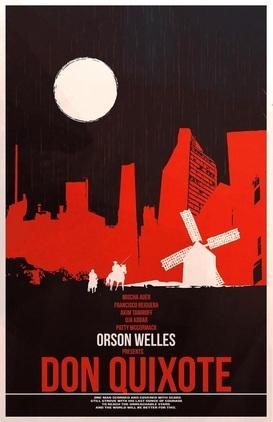 Don Quijote Fact File In the mid-1950s, Welles began work on Don Quixote, an enormous project that would span decades.
Don Quijote Fact File In the mid-1950s, Welles began work on Don Quixote, an enormous project that would span decades.In 1961, Welles got distracted and directed "In the Land of Don Quixote", an 8 part series for Italian television in which Welles and his family presented different travel stories through Spain.
in 1969 the lead character died. And in the same year, Welles decided to rewrite the end, after he had filmed Quijote and Sancho Panza going to the moon. Once It had actually been achieved in real life, his version appeared redundant. So he filmed another ending.
Don Quijote was never completely finished, even on Welles' death it was no more than a collection of edits.
In 1992 a compilation was made and released, and then again in 2008 when a film was released to mixed reviews.
Filming in Spain 2: Treasure Island and Chimes at Midnight In 1964, he began to work with film producer Emiliano Piedra who had wanted to collaborate with Welles on a version of Treasure Island to be shot in Alicante. Welles agreed in order to get Piedra to work with him on Chimes at Midnight - his classic Shakspearian compilation. Although he had no real intention of shooting the Treaure Island film, he did write two screenplays in the 1960s, eventually forming the basis of the 1972 film in which Welles played Long John Silver.
Welles and Piedra filmed Chimes at Midnight (7.9 IMDB) in Colmenar, then Madrid, Pedraza, Soria and parts of the Basque country. - eventually completing the film in 1966.
Welles was man who would start a thousand projects, but complete only so many. Projects would last decades and whilst they dragged on, he would start others, such as this story about the world of the bullfight. Watch this incredible bit of Wellesian propoganda as he pushes for funding about what appears to be an autobiogrpahical piece, introducing ideas of reality TV that would come back and haunt us in the 21st century.
Towards the end of his life, permenantly broad-hatted with a cigar clenched Clint-Eastwood-style between his beardy-lips, Welles spent more and more time in Spain, persuing his passion for food, drink and life as well as his fascination for la corrida.
An Awesome Well in Ronda
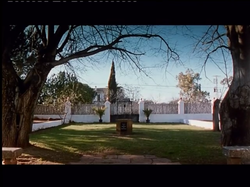 The Awesome Well On October 10, 1985 George Orson Welles died from a heart attack on the same day as Yul Brynner and the same week as Rock Hudson died. Hollywood mourned the loss of such giants.
The Awesome Well On October 10, 1985 George Orson Welles died from a heart attack on the same day as Yul Brynner and the same week as Rock Hudson died. Hollywood mourned the loss of such giants.Despite having wished his body to be buried in one of the small villages that appeared in Chimes at Midnight, Welles' body was instead cremated and two years later, the remains of both Welles and Paola Mori were dropped down a well on a small finca on the outskirts of Ronda - a patch of earth owned by an old bullfighting friend - Antonio Ordóñez.
Adios Orson Welles was a creative machine: He filmed 13 full length films, 14 short films, 7 TV series and worked on 14 unfinished films. He starred, wrote or produced over a 130 productions in all and 100's of radio programs.
Some argue that a man such as Orson, a man with big appetite and a curiosity for life would never be content in the USA. He would need to stretch himself in other cultures and other lifestyles and of all the countries in Europe, Spain was the one that unaccountably tugged at his heart.
Awesome Orson In the final conclusion of his visit to the Basque Country in Around the World, Welles looks starrily into the sky during a firework fiesta on the streets of the town. Then slowly he looks back at the camera and says: "Here in the Basque country people do not end their stories with 'and so they lived happily ever after'. Instead they say 'And if they lived well, they died well.'"
Welles looks mournfully back up to the sky and in his face you see the desire to do so too. Did he live well? He most certainly did. Did he die well? Not exactly, but he did end up in a well. And in Spain. Maybe that counts for something.
In Search of Orson In 2005 Kristian Petri made a short documentary called The Well, in which he travels through Spain looking for the legacy of the large bearded one.
Unfortunately, the very day I posted this article the video was removed from Youtube. It may return. let me know if it does. Its worth watching.
Ask not what you can do for your country. Ask what's for lunch.
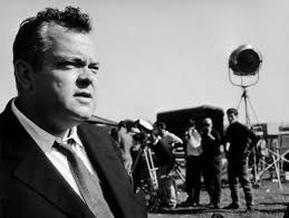 Orson Looking Awesome
Orson Looking Awesome What's happening now is what happened before, and often what's going to happen again sometime or other”Orson and the Peas Watch this great animated short of out-takes on Welles reading for the Findus Peas advert. Hilarious, charismatic and obstinate, Welles was off-screen as difficult as on screen. If the Link
Orson Welles - "Frozen Peas" Extended Animation Cut from Closer Productions on Vimeo.
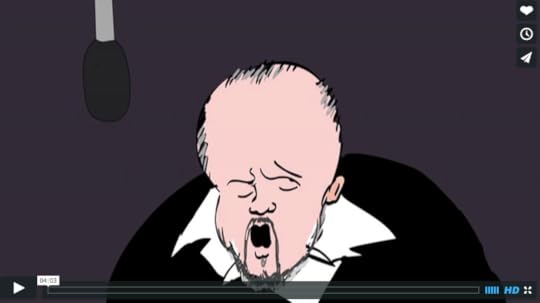 Click on image above to watch video
Click on image above to watch video “We're born alone, we live alone, we die alone. Only through our love and friendship can we create the illusion for the moment that we're not alone.”
Read all the essential stories on Spain from another perspective: Life in the Tortilla Village, Slow Living and Stunning PhotoBooks
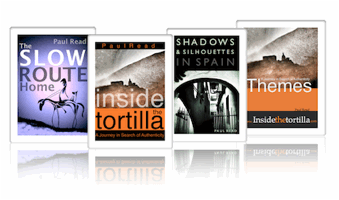
June 15, 2014
Speaking Of Spain
- Paul Read's profile
- 25 followers



